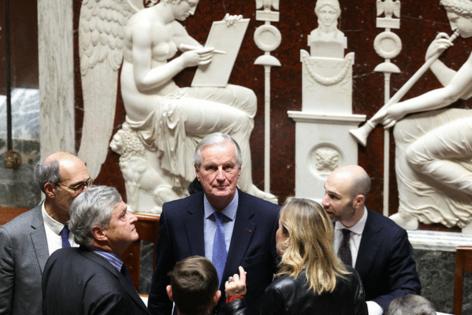French far right joins forces with left to topple government
Published in News & Features
Far-right leader Marine Le Pen teamed up with a left-wing coalition to topple the French government, pitching the country into a prolonged period of turbulence that’s likely to further unsettle investors.
A majority of lawmakers in the National Assembly backed a no-confidence vote against Prime Minister Michel Barnier’s three-month-old administration following a dispute over next year’s budget. It was the shortest tenure for a premier since France’s Fifth Republic was founded in 1958.
The roots of the current turmoil date back to June, when President Emmanuel Macron called a snap vote as he sought to rebound from defeat in the European elections. Instead, he made Le Pen’s National Rally the largest party in parliament and its leader became the country’s most influential power broker while his centrist coalition crumbled.
“To those who think I’m intent on choosing a policy of disaster through a vote of no confidence, I want to tell them that the disastrous policy would be not to censure such a budget,” she told lawmakers on Wednesday. “It’s the end of this ephemeral government.”
The chaos in the European Union’s second-biggest economy prompted bond investors to punish France’s sovereign debt relative to its peers, pushing up borrowing costs beyond countries like Spain and Greece, that have traditionally been seen as riskier.
Barnier had warned of a “storm” in financial markets if he was ousted.
The outgoing administration will continue in a caretaker capacity for the time being, allowing the government to avoid a U.S.-style shutdown. Barnier can use emergency laws to collect taxes and guarantee a minimal level of spending, but the broader impact is hard to predict.
Finance Minister Antoine Armand warned Tuesday that stopgap legislation would raise taxes for millions of households and block planned spending increases for some priorities, including security and farming.
Barnier becomes the first French prime minister to lose a no-confidence vote in more than 60 years. The only other premier to be ousted under the Fifth Republic was Georges Pompidou in 1962 and, with the backing of the powerful president, Charles de Gaulle, he was eventually reappointed.
There is little to suggest that the current stalemate will end so easily.
Macron has the authority to appoint a new prime minister, but he had a lengthy struggle before he managed to win limited support for Barnier from a fragmented parliament and it’s likely to be tougher the second time around.
Following the June ballot, the lower house was split into three fiercely opposed blocs: a diminished center supporting the president, a leftist alliance and the far right led by Le Pen. That makeup won’t change as a new parliamentary election can’t be held until July at the earliest.
The divisions between those groups have been exacerbated by the economic problems facing France, with the budget deficit set to exceed 6% of GDP this year and voters reluctant to accept spending cuts or higher taxes.
When Macron does appoint a new premier, that person will immediately need to pass a budget for 2025 and they will face the same financial squeeze that brought down Barnier’s administration.
The budget bill presented by Barnier’s government contained €60 billion ($63 billion) in tax increases and spending cuts that aimed for a reduction in the deficit to 5% of economic output in 2025, from an estimated 6.1% this year.
“This won’t disappear with the magic of a no-confidence motion,” Barnier said as he appealed to opposition lawmakers not to force him from office. “This no-confidence motion will make everything more severe and harder.”
Le Pen argues that the only way to break the impasse and allow France to move forward is for Macron himself to resign and call a new presidential election. Macron has said he won’t step down until his term ends in 2027 and he can’t be forced out of his job.
“It’s up to his conscience to decide whether he can sacrifice public action and the fate of France to his own pride,” she said.
Le Pen is the frontrunner for the next presidential election, according to opinion polls.
-------
With assistance from Tom Fevrier.
©2024 Bloomberg L.P. Visit bloomberg.com. Distributed by Tribune Content Agency, LLC.







Comments